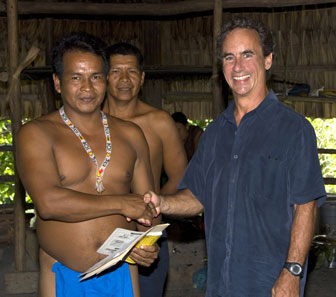STRI goes carbon neutral as Panama indigenous community to see carbon payments from forest conservation
Indigenous community in Panama to see carbon payments from forest conservation
mongabay.com
August 21, 2008
|
|
The Smithsonian Tropical Research Institute (STRI), the Panama-based branch of the Smithsonian Institution, will offset its carbon dioxide emissions by working with an indigenous community to conserve forests and reforest degraded lands with native tree species. The agreement was announced Sunday, August 17, 2008.
The initiative is based in the premise that tropical forests sequester large amounts of carbon dioxide, an important greenhouse gas. By protecting forests — thereby avoiding emissions from deforestation — and establishing plantations with native tree species, the program will generate carbon credits that STRI can use to offset the emissions that it can not reduce via a new energy efficiency program. Extra credits may be sold in the voluntary carbon market. The proceeds will be used to establish a fund that benefits all members of the Embera community of Ipeti.
“I hope that our model for community-based carbon offset will show that the carbon market can directly benefit local people while helping Panama to remain an international leader in the global effort to reduce emissions from deforestation under the United Nations’ Framework Convention for Climate Change,” said Catherine Potvin, a McGill University professor and a research associate at the Smithsonian who has worked cloesly with the Embera community in Ipeti.
 Photo by Marcos Guerra, STRI: Bonarge Pacheco, Jeremía Casarí, Eldredge Bermingham |
“As the community replants deforested areas with native species, we replant traditions vital to the conservation of our way of life,” added Omaira Casama, the first woman to hold the level of cacique — the highest authority in the General Congress — and an integral part of the project’s planning over the past four years. “This is a very positive step toward confronting the ongoing devastation of natural resources and protecting the environment in the region.”
“The Ipeti pilot project, if conducted in compliance with all of the regulations required by international carbon credit markets and local legislation, will be our focus as we develop national standards and propose future projects in the context of the World Bank’s Forest Carbon Partnership Facility pilot activities,” said Eduardo Reyes, of Panama’s Environmental Authority, ANAM.
Last month the World Bank selected Panama as one of 14 pilot countries to lead an effort to reduce emissions resulting from deforestation and forest degradation (REDD). The proposed climate change mitigation mechanism would pay tropical countries for protecting the carbon stock of natural forests.
“This Smithsonian contribution to mitigating greenhouse gas emissions is a direct result of Catherine Potvin’s foresight in adapting her studies of plant carbon uptake to Panama’s cultural and economic reality and represents a very positive step in support of our basic research on the impact of global change on tropical forests and water availability and our Climate Partnership with HSBC, the World Wildlife Fund, Earthwatch and the Climate Group,” said Eldredge Bermingham, director of the institute.
In its bid to become carbon neutral, STRI will offset 4,000 tons of CO2-equivalent emissions per year for the next three years.